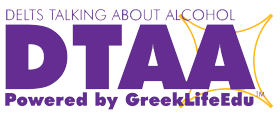
Drug/Alcohol Policy
Delta Tau Delta has a written set of policies called the Member Responsibility Guidelines (“MRG”). The Guidelines set out our policies related to illicit drugs and alcohol. Failure to abide by the Guidelines subject the member and chapter to discipline.
Alcohol Free Housing
The chapter house at the University of Nebraska has been alcohol-free since the 90s. Members are not permitted to drink alcohol in the facility.
Alcohol Rules
- The chapter may not purchase alcohol with chapter funds or coordinate any effort for a collection of funds to purchase alcohol. No charging admission fees, drink tickets, vending machinesAll social events with alcohol must have a third party licensed vendor who is insured to sell alcohol to people of legal age (bartender) or must be legally purchased by individual members and brought to the event for their own consumption only.
- No bulk quantities of alcohol can be purchased or served (ex: kegs).
- No alcohol above 15% alcohol by volume is allowed unless served by a licensed and insured third party vendor.
- Social events are only open to members and invited guests only. No open parties.
- No alcohol shall be present at any recruitment function, new member program, or initiation activity.
- Drunkenness by members is classified as “conduct unbecoming a member of the Fraternity” and subject to discipline.
- No drinking games that encourage excessive drinking.
- No members shall purchase, serve, or sell alcoholic beverages to any minor.
- The chapter may not coordinate or implement a designated driver program. All transportation to and from social events shall be through a licensed and insured third party transportation service.
Drug Policy
The use or possession of any unlawful drug in any form at any Delta Tau Delta function or in any Delta Tau Delta shelter will be grounds for suspension of the individual.
Education
Members participate in our national alcohol education program Delts Talking About Alcohol (“DTAA”). This program shares ways to reduce the risk involved with any type of alcohol-related problem. The program aims not to preach but rather educate members about alcohol and its effects on the mind and body. It also teaches members about the effects of drugs, hazing, and sexual assault. Whether a member decides to drink or not, DTAA empowers students to make well-informed decisions and better cope with the drinking behaviors of their peers.
